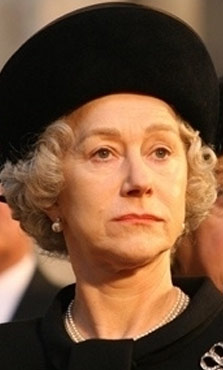|

Stephen Frears’ “The Queen”, anchored by sterling performances by Helen Mirren as Elizabeth and Michael Sheen as Tony Blair, is a fascinating glimpse at the calculus of survival politicians must learn in order to placate their media-saturated electorate. Smartly understated and evenly spliced with real TV clips, the movie explores a week in the lives of two English rulers, one whose best days are behind her, and the other whose darkest are ahead. Mirren’s brilliantly portrays a woman of densely-packed ironies. Her monarch is baffled by the important requirements of the crown but commands the royal canines with the stern authority of a Caesar. If anything, Mirren found too much humanity in her Elizabeth. If she is indeed a woman who believes she rules with God’s mandate, the subtle irruptions of warmth on Mirren’s imperious visage detract from what one imagines is the real monarch’s inhuman air of preternatural command.
Politically and pyschologically, the film is at once a model of clarity and also a strangely murky affair: the chambers of power are thrown open to our eyes with characters and scenes that are easily graspable, yet there is a faintly allegorical strain in the film which, though Frears seems to want it to, never coalesces into any coherent commentary or risks any judgments of its characters. Frears has made Blair and “Mum” intelligible as people, on the one hand, and as politicians, on the other, but never both at the same time. Elizabeth, straitjacketed by protocol, contains a personal spark that is obvious but never quite visible, whereas Blair, an improvising, political survivalist, inhabits the suburban life of a regular schlub without really behaving like one. Their inner lives are in the details, but lack the sweep of will or intention. In the end the only conclusive ideas here are that power isolates, the English gentry are stuck in the eighteenth century, and Labour PMs fall for their queens. In granting Blair and the Queen their due complexity, even as he displays their less sympathetic qualities, Frears has created a film that cares more about good taste than truth, a bad but not fatal flaw in an entertaining, well-observed slice of speculative fiction enlivened by Mirren’s and Sheen’s deft impersonations.
The third major presence in the movie is not contained in one character, though, but rather in the faces and flowers of the mourners who spilled into the streets around Buckingham Palace to lament the dead princess. If our empathy for Blair and Elizabeth waxes and wanes, so too does it fluctuate for the throng of weeping citizens at the gates. For instance, most people watching “The Queen”, especially in America, will be unaware of the royal protocol regarding the flag staff above Buckingham Palace. When we see that there is no flag flying at half mast, we, like Blair, are appalled by the lack of emotion, let alone political sense, shown by the royals. But shortly we learn that the flag staff is almost always bare, never adorned by the Union Jack, and not flown at half-mast after the death of even the highest members of the royal family. The people’s outrage suddenly appears unseemly, even petulant. By the time the queen almost drolly warns Blair in the last scene that one day he, too, will have his turn on the rack of public opinion, we already have the impression that the mob has not acted entirely righteously and could indeed turn on its champion as viciously as it pursues the villain of the moment.
Thus, as central as the two leaders are, the larger unresolved issue in “The Queen” is the populace, the mob, so volatile and seemingly so vulnerable to the dictates of the tabloid press. They are anonymous and impotent, but deeply sinister, too. Belying the ultramodern circumstances of Diana’s paparazzi-smothered death, the royal reaction to her passing opens ancient reservoirs of hostility across the realm. Elizabeth can’t get the poll results out of her mind—one in four Britons want the monarchy dismantled—and Blair, as if bitten by a wasp, objects to the inclusion of the word “revolutionary” in one of his speeches because it cuts a little too close to the bone. Though his expertly managed reaction to Diana’s death wins Blair the English public’s support (“Blair more popular than Churchill shock”, jokes an aide), he is as nakedly open to attack as the queen, and Frears’ dark hint that society beyond the palace gates may be out of control ultimately makes “The Queen” more an unsettling portrait of contemporary culture than an insightul portrait of two public figures. A mindless mob driven by incendiary headlines is the shape of things to come, and the film’s most delicious irony is that it’s not the slick, focus-group tested “modernizer”, but instead the stodgy, superannuated old relic, who knows it. |
|